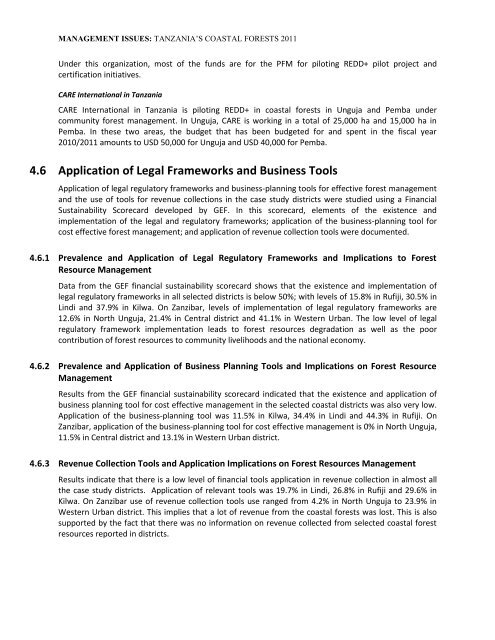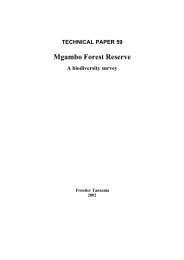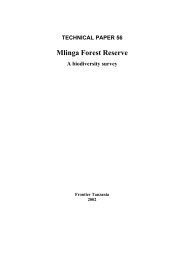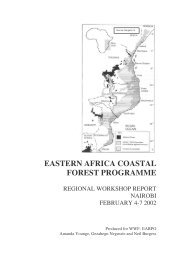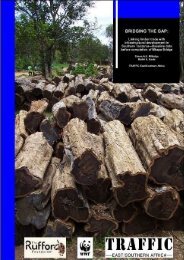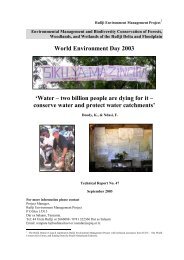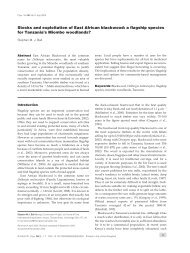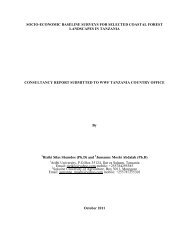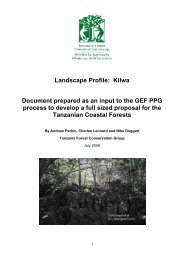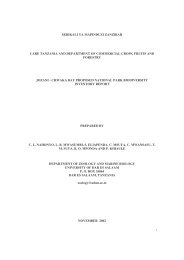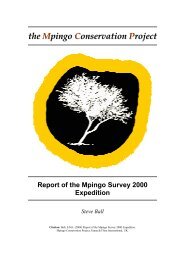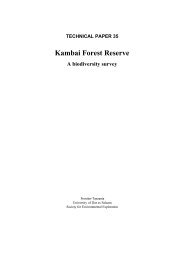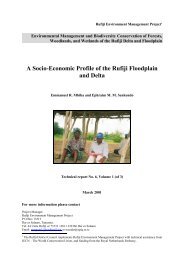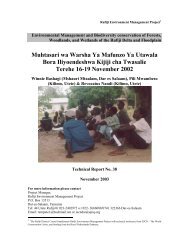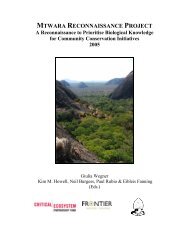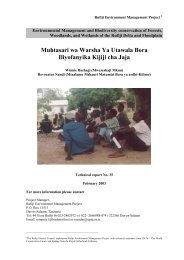Neil D. Burgess, Paul Harrison, Peter Sumbi, James Laizer, Adam ...
Neil D. Burgess, Paul Harrison, Peter Sumbi, James Laizer, Adam ...
Neil D. Burgess, Paul Harrison, Peter Sumbi, James Laizer, Adam ...
Create successful ePaper yourself
Turn your PDF publications into a flip-book with our unique Google optimized e-Paper software.
MANAGEMENT ISSUES: TANZANIA’S COASTAL FORESTS 2011<br />
Under this organization, most of the funds are for the PFM for piloting REDD+ pilot project and<br />
certification initiatives.<br />
CARE International in Tanzania<br />
CARE International in Tanzania is piloting REDD+ in coastal forests in Unguja and Pemba under<br />
community forest management. In Unguja, CARE is working in a total of 25,000 ha and 15,000 ha in<br />
Pemba. In these two areas, the budget that has been budgeted for and spent in the fiscal year<br />
2010/2011 amounts to USD 50,000 for Unguja and USD 40,000 for Pemba.<br />
4.6 Application of Legal Frameworks and Business Tools<br />
Application of legal regulatory frameworks and business-planning tools for effective forest management<br />
and the use of tools for revenue collections in the case study districts were studied using a Financial<br />
Sustainability Scorecard developed by GEF. In this scorecard, elements of the existence and<br />
implementation of the legal and regulatory frameworks; application of the business-planning tool for<br />
cost effective forest management; and application of revenue collection tools were documented.<br />
4.6.1 Prevalence and Application of Legal Regulatory Frameworks and Implications to Forest<br />
Resource Management<br />
Data from the GEF financial sustainability scorecard shows that the existence and implementation of<br />
legal regulatory frameworks in all selected districts is below 50%; with levels of 15.8% in Rufiji, 30.5% in<br />
Lindi and 37.9% in Kilwa. On Zanzibar, levels of implementation of legal regulatory frameworks are<br />
12.6% in North Unguja, 21.4% in Central district and 41.1% in Western Urban. The low level of legal<br />
regulatory framework implementation leads to forest resources degradation as well as the poor<br />
contribution of forest resources to community livelihoods and the national economy.<br />
4.6.2 Prevalence and Application of Business Planning Tools and Implications on Forest Resource<br />
Management<br />
Results from the GEF financial sustainability scorecard indicated that the existence and application of<br />
business planning tool for cost effective management in the selected coastal districts was also very low.<br />
Application of the business-planning tool was 11.5% in Kilwa, 34.4% in Lindi and 44.3% in Rufiji. On<br />
Zanzibar, application of the business-planning tool for cost effective management is 0% in North Unguja,<br />
11.5% in Central district and 13.1% in Western Urban district.<br />
4.6.3 Revenue Collection Tools and Application Implications on Forest Resources Management<br />
Results indicate that there is a low level of financial tools application in revenue collection in almost all<br />
the case study districts. Application of relevant tools was 19.7% in Lindi, 26.8% in Rufiji and 29.6% in<br />
Kilwa. On Zanzibar use of revenue collection tools use ranged from 4.2% in North Unguja to 23.9% in<br />
Western Urban district. This implies that a lot of revenue from the coastal forests was lost. This is also<br />
supported by the fact that there was no information on revenue collected from selected coastal forest<br />
resources reported in districts.


